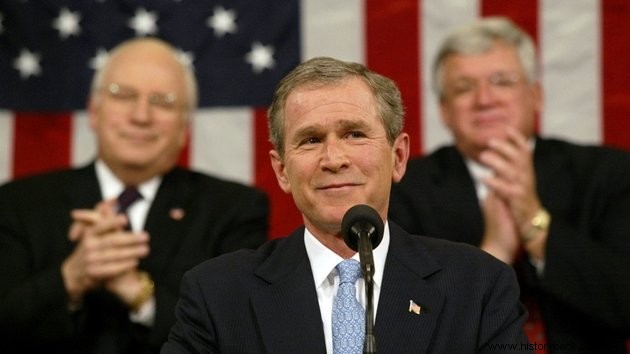The Bush Doctrine was an American foreign policy guideline established by US President George W. Bush in 2002.
This ideology favored preventive war, the fight against terrorism and the free movement of capital.
It also declared three countries as members of the "Axis of Evil":Iraq, Iran and North Korea.
Historical Context of the Bush Doctrine
After eight years of government by Democrat Bill Clinton, Americans elected Republican George W. Bush as president.
The government of the Republicans is almost always characterized by isolationist rhetoric and with George W. Bush it was no different.
Bush ruled during one of the worst economic crises and was the first president to face an attack on American soil since World War II.
The Bush Doctrine was launched by the president in January 2002, during his State of the Union address, delivered to the US Congress.

On this occasion, the president presented his ideas on the role of the United States in the world to Congress. He stated that the scenario had changed after the attacks of September 11, 2001 and that the United States should not wait for another terrorist attack but rather be proactive.
The president took advantage of the wave of patriotism and fear that was taking hold in American society to send a warning message to the world. More than ever, the United States wanted to be the only power to dominate the planet.
See also:United StatesAxis of Evil
George W. Bush singled out three countries as potential enemies for the United States:Iran, Iraq and North Korea. He nicknamed them the "Axis of Evil".
According to the US State Department, these countries possessed nuclear weapons and weapons of mass destruction. In this way, they constituted a serious threat to the security of the United States.
UN inspectors, however, proved that Iraq did not have weapons of mass destruction. As for North Korea, nothing could be verified due to the dictatorial regime that prevails in this country.
Ignoring the UN reports, Bush decided to declare war on Iraq, which was ruled, at that time, by Saddam Husseim.
Preemptive War and War on Terror

After World War II, the United States maintained the stance of declaring war on a state only when it was attacked.
In a US foreign policy twist, President Bush stated that the United States should preemptively attack countries that are deemed to be dangerous to national security, even if there is no real danger.
Bush also declared war on terrorism and called "terrorists" all those who posed a threat to the United States. Therefore, groups as different as the rebels in Chechnya (Russia), Al-Qaeda, drug traffickers in Colombia and the FARC were included as terrorists.
See also:Terrorism:definition, attacks and terrorist groupsConsequences of the Bush Doctrine
The United States declared war on Iraq in 2003, pursued Osama bin Laden (responsible for the 9/11 attacks) and provided military aid to Colombia.
With that, the world was divided between countries that supported the United States and nations that declared themselves against American foreign policy.
Among the countries that helped the Americans in the war are Great Britain, Spain and Australia. In Latin America, Colombia was the country that most aligned itself with this policy and thus received help in the fight against drug trafficking.
On the other hand, nations such as France, Germany and Russia constituted the "Axis of Peace" and opposed the invasion of this Middle Eastern country.
One of the goals of the Iraq War was achieved with the overthrow of Saddam Hussein's regime. However, Osama bin Laden would only be captured during the administration of Barack Obama.
See also:North American imperialism